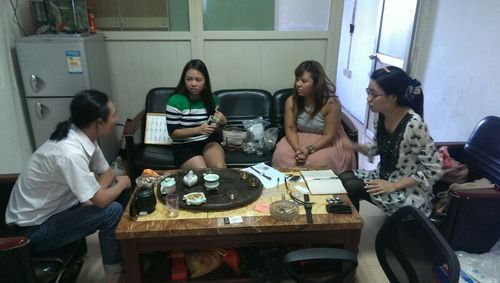First up on our tour was our main watch factory. This factory manufactures and assembles our watch faces as well as acts as our shipping agent. All of our factories ship the components for the watches to this one factory and they ship the final product to us. There are about 3 different factories that go into making one watch collection, the watch face, the strap, and the packaging. There needs to be a great deal of cooperation and coordinating between the factories to make sure QC is up to standard and deadlines are met. We took a tour of the facilities and then met with our sales rep and the “shifu” or boss. We sat down and discussed what collections we are in the process of designing and what they can do to make it a reality. We also talked about the quality issues of our existing collections and what they can do to ensure better QC. There were a few main key points I took away from this meeting, and other factory meetings:
1. Building a long term relationship is incredibly important for both the designer and factory. It is beneficial for the designer because it ensures the factory will bend over backwards for whatever request the designer makes. That’s important for a small start-up that might have to “bootstrap” their operations. It is not efficient for a small company to have high defect rates or spend a lot of money on manufacturing. The factory wants the repeat business as well. They will work with you on lower minimums or other special requests to ensure you as the designer will continue to work with them. The hope is that your PO’s will continue to increase as your business grows.
Fun fact: Contracts are hard to enforce in China. The legal system is not as “legal” there as say, in the US or EU. A lot of businesses rely on a practice termed “guanxi”. Since contracts are not commonly used as the absolute rule of law, guanxi is helpful in building trust and business networks. According to Scott Lane, CEO of the Red Flag Group, guanxi is described, in part, a personal connection between two people in which one is either able to prevail upon another to perform a favour or service, or be prevailed upon in mutual relation and understanding and for mutual interest and benefit (https://www.redflaggroup.com/resource/Compliance-Insider-02-SEP-NOV-2012.pdf).
2. Constant open communications are a must. Winky stays up in the wee hours of the night communicating with our factories (due to the opposite time schedule) to ensure deadlines are being met and issues are being addressed. When we arrived to the factory and sat down to talk, our sales rep, Winky, and the shifu could jump right in and discuss the important issues because there was already an understanding of what we needed.
3. Chinese people are incredibly hospitable. While this might not seems as relevant as the other two points are, it is important to note how business is conducted. As soon as we sat down, the shifu had tea ready for us and poured us new cups as soon as we finished the one in front of us. It is important to not only discuss the business at hand, but to also inquire about families and other personal lighthearted matters. This also contributes to having a trusting relationship.
4. The factories really are not in dismal conditions, really. The city we were in is a manufacturing city so it can seem a bit rough around the edges, but people here are hardworking and get compensated fairly for the work they do. They have standard 8:30-5pm working days and usually live in apartments provided by the workplace. Some factories were more structured than others but people at this particular factory were walking around and joking with each other. Our sales rep seemed to be very comfortable in addressing the shifu and even challenging him on pricing on our behalf!
From L to R: the shifu, Winky, me, and Windy discussing business
There were a few more factory visits which will be discussed in the next chapter…stay tuned!


No comments:
Post a Comment